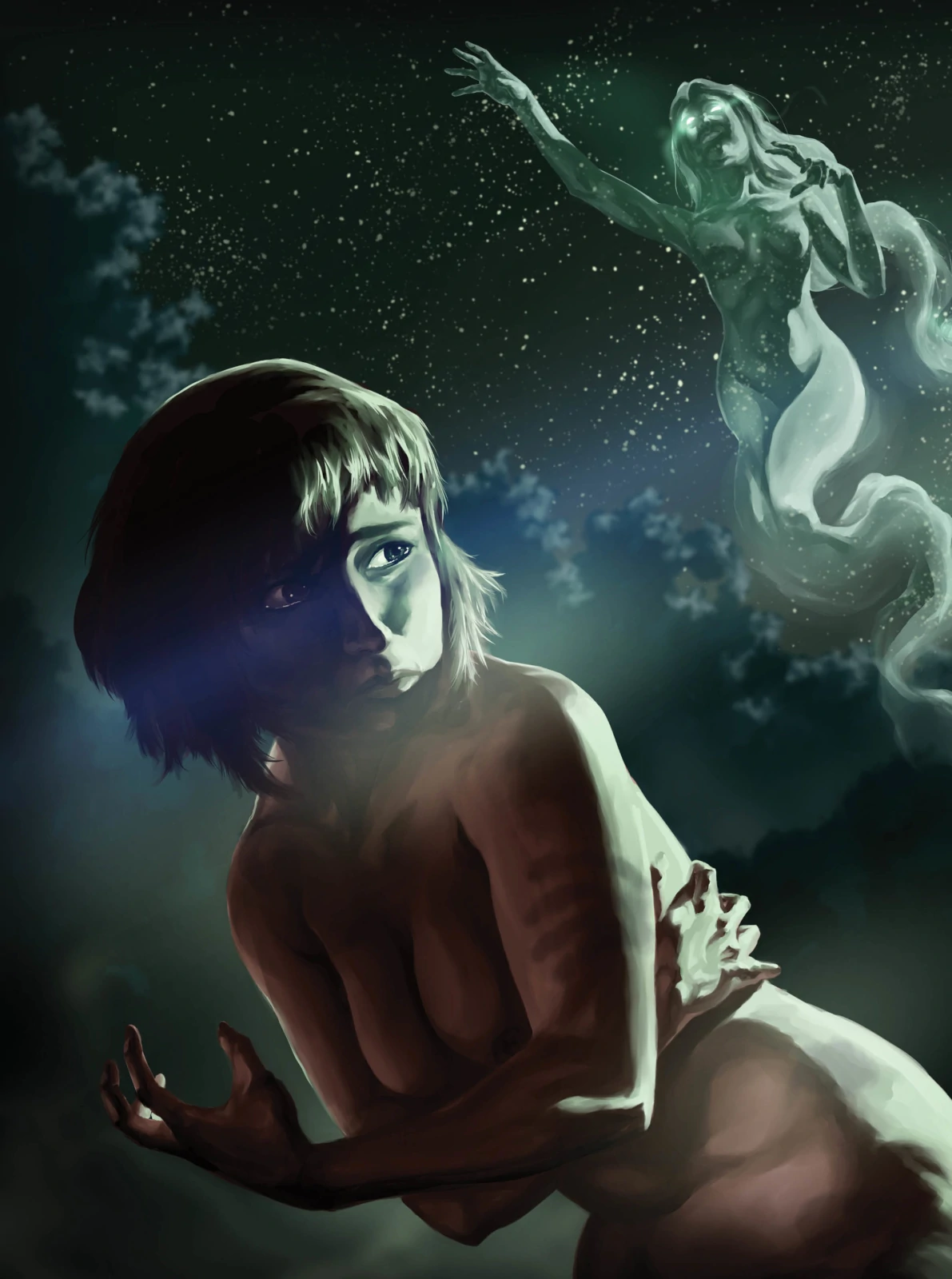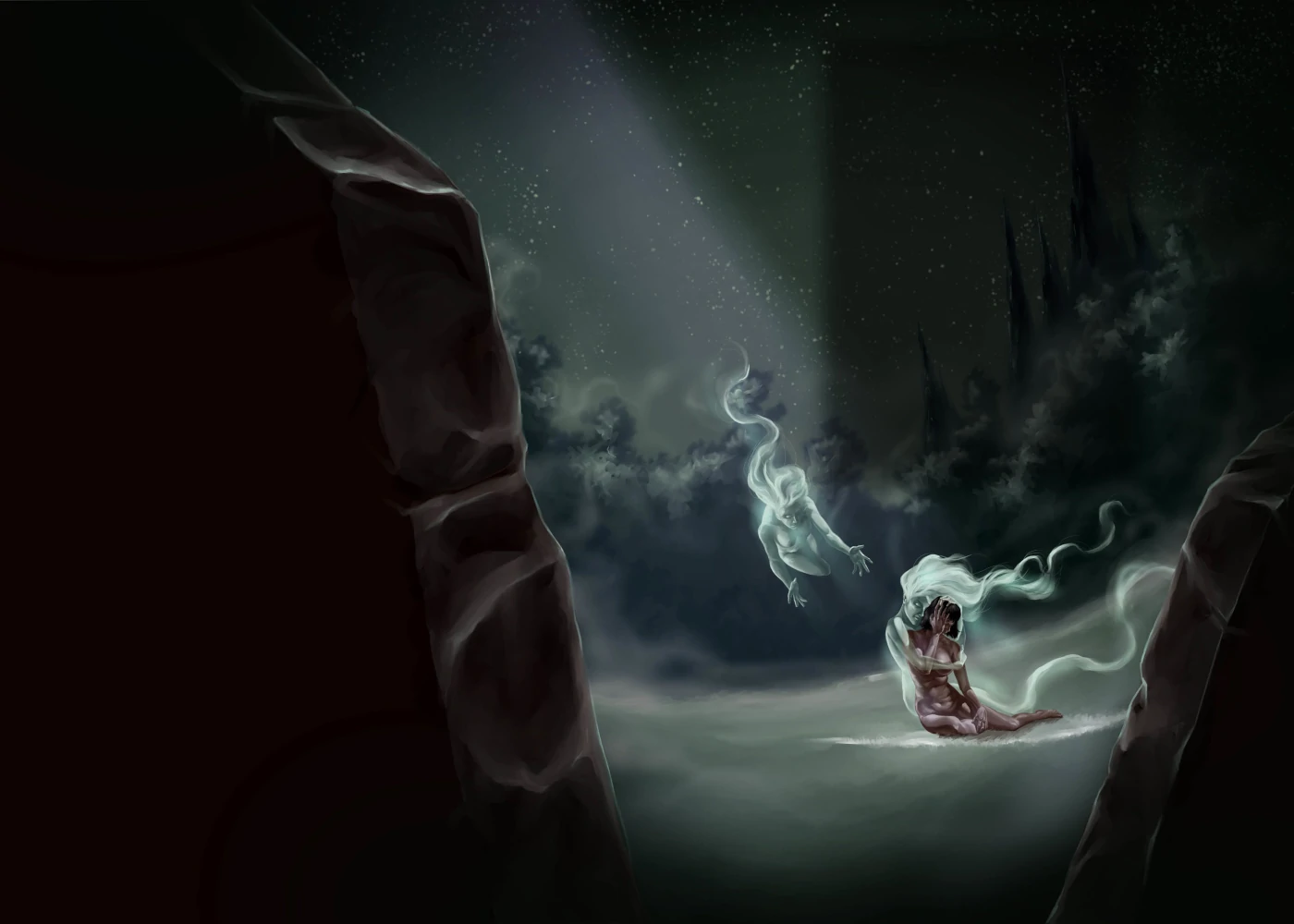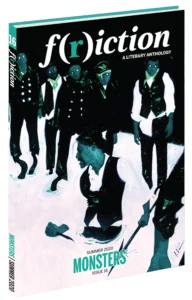
Someone Else’s Soul
Words By Marisa Crane, Art By Daniel Reneau
Quiet down, we have a lot to say and not nearly enough time to say it. We realize you’re only passing through. In fact, we’re shocked you managed to find us all the way out here at all.
Is that a cigarette between your lips? Never mind, we can smell the earthy citrus scent. We love weed. Especially a good indica. We suppose we have no use for it now, but smoking used to take the edge off when we couldn’t find sleep. When Brandon was out all night, phone as dead as we are now. In the morning he’d roll over—his breath reeking of whiskey and tar and someone else’s soul—and lay his strong hand on our stomachs, asking for mercy with his eyes.
You make me want to be better, he used to say. And we foolishly believed him.
Take a seat, if you want. Our tombstones are comfortable and welcoming. Brandon made sure of that. We are tenderness, we are grace, we are patience in the face of fear. We have learned how to store our feelings in our vertebrae. How to compress our needs to make room for his.
We weren’t always this small, we swear.
He’s all I’ve ever wanted, we used to say to our friends over rushed dinner dates and chugged wine. He needed us back home, but we didn’t dare say it like that. I’m tired. Chores to do. Work early in the morning. You know how it is. Great to see you.
Can you make out our epitaphs? They are poignant and beautiful, aren’t they? Penned by Brandon himself on his way out. Now when he speaks of us—to his wife, to his friends, to his brother—he recites our inscriptions, one by one. Like gospel. Like penance.
She made me who I am today.
She helped me become a better man.
I wasn’t always this kind.
I was damaged.
I didn’t know how to love someone properly.
Without her, I would still be selfish and cruel.
How many of us did it take to create him? We’re afraid we’ve lost count over the years. Can you calculate the exact number? Do you think Brandon can? We suppose we would look alarming, wouldn’t we, if he hung us up to check—our corpses dangling in front of a chalkboard, the plus signs looking like miniature crosses between us.
Some mornings we’d crawl out of bed, careful not to wake him. We thought if we scrubbed hard enough, we could remove his fingerprints from our bodies. Our bodies. What a foreign concept. He put pills in our bodies. He left bruises on our bodies. He tied strings to the limbs of our bodies. He chopped off our feet and we grew new ones made of eggshells. We were too tired to grow something stronger—say an escape plan, say feet with wings or propellers.
I love him, we’d say to our reflections in the mirror, our skin drooping off our skulls. Why else would we stay?
Come back to bed, he’d call to us while we were busy relearning our bodies in the bathtub. We could hear the faithless smile in his voice; he’d forgotten how his venomous words hovered above us, ready at any moment to come crashing down and steal our air once again.
I’ll sing you your favorite song, he’d call to us, already playing the opening chords on his guitar. His voice was high and angelic. We’d take a deep breath, dry ourselves off, and crawl under the covers next to him.
We don’t have to explain why.
Have you noticed that we are buried in a perfect line, our bodies decomposing at different rates? Brandon didn’t have the guts to bury us himself. After each of our deaths, he hired a gravedigger. Fled the scene. Sought solace in another woman. Left the dirty work for someone else.
No one sets roses on our graves. Not even our mothers, wasted with worry. You used to be so happy, so full of zest, they’d say. What is it? What’s wrong? Just tell me and I’ll make it better, they’d plead. When they asked the police to investigate our deaths, the police said there was nothing to investigate. Just some silly girls playing silly games. Our mothers now spend their nights drinking, scouring Facebook for clues.
In his marriage, we are immortalized. Can you believe it? All we ever wanted was to be holy in his eyes. Now we are, and we don’t know how to be anything else. We are worshipped for our sacrifice. Celestial beings he conjures up when he’s had a drink or five. Even in death, we have no control over our voices or appearances. We dance when he says dance. We sing when he says sing. And we praise the goodness of his heart when his brain won’t stop reminding him of who he used to be.
Everywhere he goes, he is celebrated for his respect, his courtesy, his loving communication. Where did you find this man? women ask his wife. She laughs and shrugs, her eyes meeting his.
Are you okay? Your eyes look bloodshot, and not just from the weed.
It’s okay if you want to leave. We won’t blame you. You’ve been out here quite a while. Soon it will grow dark and we wouldn’t want you to run into him out here, wasted and digging up rotten memories.
We watch as you stumble down to the river and strip off your clothes, dipping your naked body in the cool rushing water. Your body. What a foreign concept. Your body belonging to you. Blessed. Powerful. Indisputably yours. Perhaps you think nothing of it.
Here we are again, alone with our ghostly reminders. Somehow being together makes us all the more lonely.
That is, until you return, revealing your true identity. We’d cry, but we no longer remember how.
Do you love his sea-blue eyes just like we did? we ask. They’re mesmerizing, aren’t they? You nod the tiniest nod.
But have you noticed how his waves thrash? we ask.
You get down on your hands and knees and thank us for all we’ve done. For him. For you. From behind your back, you pull a cake—a birthday cake for deathday girls. We won’t eat that, we whisper. He made us afraid of what would happen if we dared fill ourselves with anything that wasn’t him.
Please, you say, your hands trembling. For the first time, we notice the claw marks on your wrists.
You can tell us the truth, we say. Your secret is safe with us.
There’s nothing to tell, you whisper. He’s everything I could ever ask for.
We wait in silence, the space between us expanding then shrinking then expanding again.
We know what you want to say, and we understand why you won’t say it.

